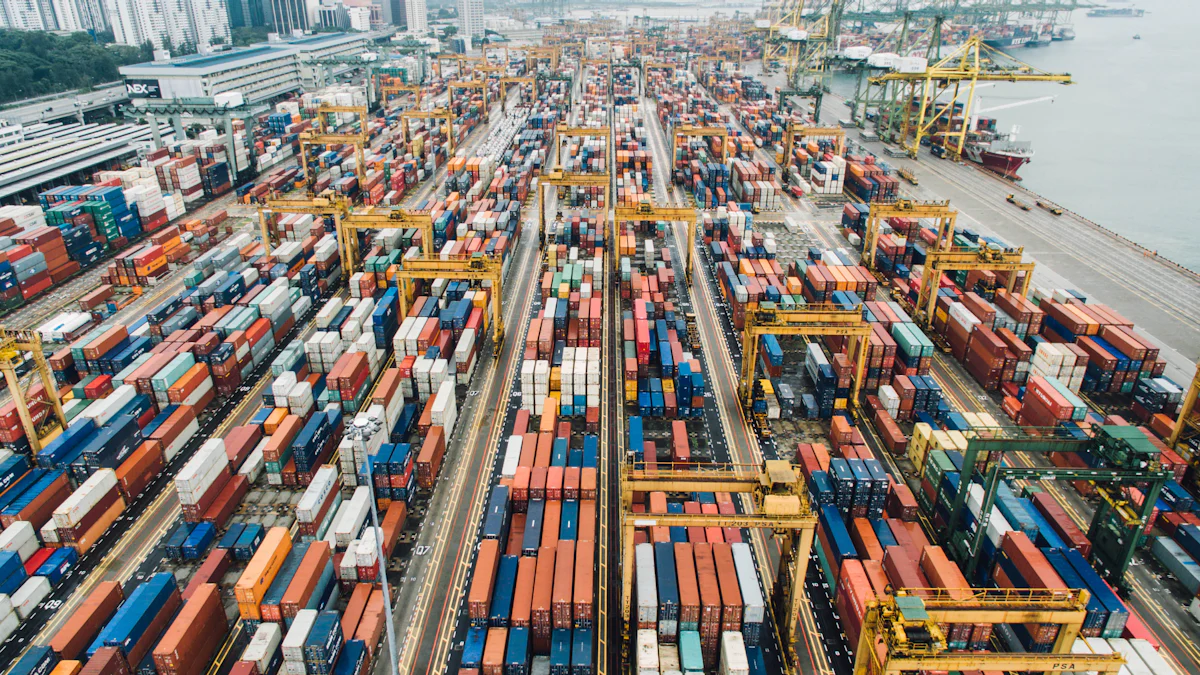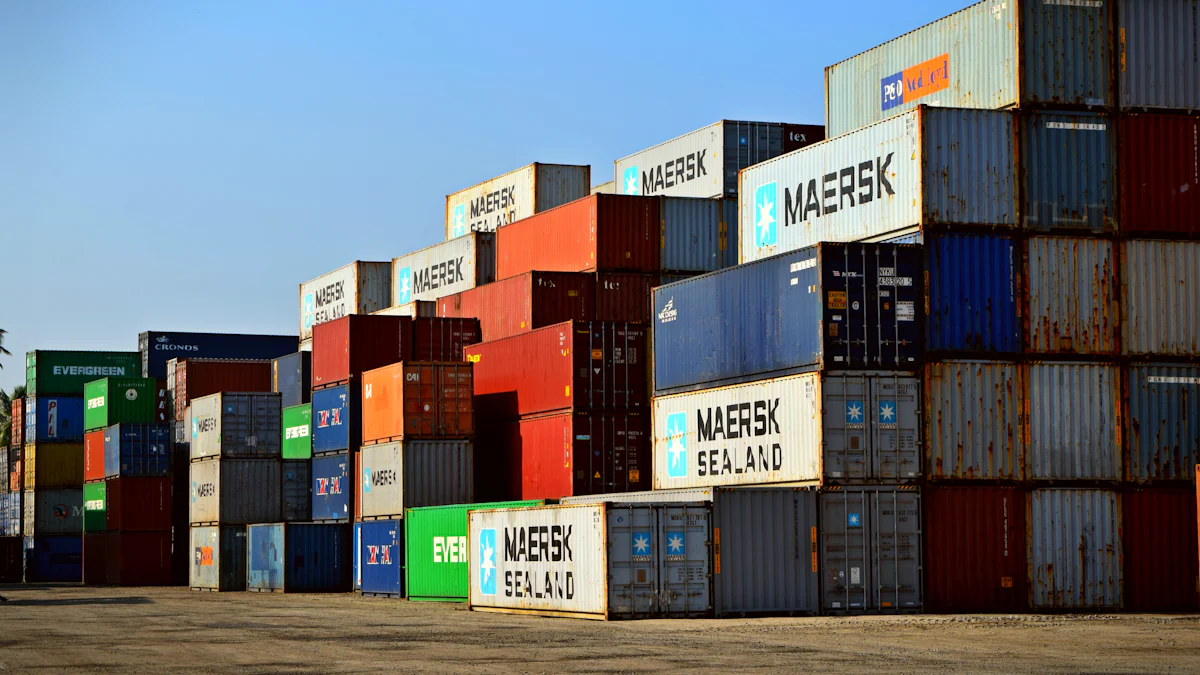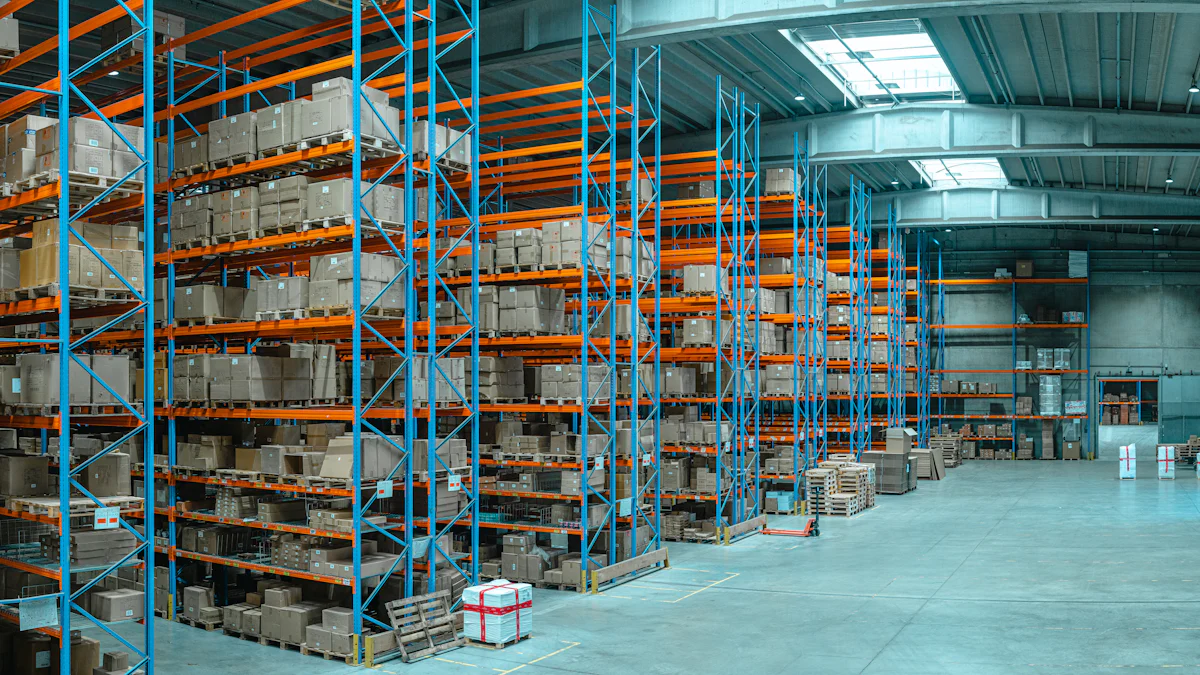B2B and B2C Logistics: A Comparative Analysis

In the realm of logistics, understanding the differences between B2B and B2C logistics is crucial for businesses aiming to optimize their supply chain strategies. B2B logistics involves transactions between businesses, often characterized by bulk orders and complex supply chains. In contrast, B2C logistics focuses on delivering individual items directly to consumers, emphasizing speed and adaptability. The B2B eCommerce market is projected to grow over 10% annually, reaching over $3 trillion by 2027, highlighting its significance. Meanwhile, the B2C segment drives growth in the global express parcels market, accounting for 59.4% in 2023.
Understanding B2B Logistics

Key Characteristics of B2B Logistics
Transaction Volume
B2B logistics typically involves handling larger order volumes compared to B2C logistics. Businesses often place bulk orders, which require efficient management to ensure timely delivery. This high volume of transactions necessitates robust systems to track and manage inventory effectively.
Supply Chain Complexity
The supply chain in B2B logistics tends to be more complex. Companies must coordinate with multiple suppliers, manufacturers, and distributors to fulfill orders. This complexity arises from the need to manage large quantities of goods and maintain a steady flow of materials to meet business demands.
Customer Relationships
In B2B logistics, customer relationships play a crucial role. Businesses often engage in long-term partnerships, focusing on reliability and trust. These relationships are built on consistent communication and the ability to meet specific business needs, which differ significantly from the transactional nature of B2C interactions.
Product Variety
B2B logistics often deals with a wide variety of products. Companies may require different types of goods, ranging from raw materials to finished products. This diversity necessitates a flexible logistics system capable of handling various product specifications and ensuring accurate delivery.
Delivery Speed
While speed is important, B2B logistics prioritizes reliability over rapid delivery. Businesses often plan their orders well in advance, allowing for longer lead times. The focus remains on ensuring that deliveries arrive as scheduled, maintaining the flow of operations without disruption.
Delivery Models
B2B logistics employs various delivery models to meet the unique needs of businesses. These models include just-in-time delivery, where goods arrive precisely when needed, and bulk shipping, which reduces costs by transporting large quantities at once. Each model requires careful planning and coordination to optimize efficiency.
Understanding B2C Logistics

Key Characteristics of B2C Logistics
Transaction Volume
B2C logistics typically handles smaller order volumes compared to B2B logistics. Consumers often purchase individual items rather than bulk orders. This results in a higher frequency of transactions. Companies must efficiently manage these numerous small orders to ensure customer satisfaction.
Supply Chain Complexity
The supply chain in B2C logistics is generally less complex than in B2B logistics. However, it requires a high level of coordination to meet consumer expectations. Businesses must streamline operations to handle the direct delivery of products to individual customers. This involves managing inventory, processing orders quickly, and ensuring timely delivery.
Customer Relationships
In B2C logistics, customer relationships focus on providing a positive shopping experience. Companies aim to build brand loyalty through excellent service and reliable delivery. Unlike B2B logistics, where long-term partnerships are common, B2C interactions are more transactional. Businesses must prioritize customer satisfaction to encourage repeat purchases.
Product Variety
B2C logistics often deals with a wide range of products. Consumers expect a diverse selection of items, from clothing to electronics. Companies must maintain a flexible logistics system to accommodate various product types. This includes managing different packaging requirements and ensuring accurate order fulfillment.
Delivery Speed
Speed is a critical factor in B2C logistics. Consumers expect fast and reliable delivery services. Companies must optimize their logistics processes to meet these demands. This often involves utilizing last-mile delivery services to ensure products reach customers quickly. Businesses that excel in delivery speed can gain a competitive edge in the market.
Delivery Models
B2C logistics employs various delivery models to enhance customer experience. These include options like same-day delivery, click-and-collect, and free shipping. Each model aims to provide convenience and flexibility to consumers. Companies must carefully plan and execute these models to ensure efficient fulfillment and customer satisfaction.
Comparative Analysis of B2B and B2C Logistics
Transaction Volume
In the realm of logistics, B2B and B2C operations exhibit distinct differences in transaction volume. B2B logistics typically involves handling larger order volumes. Businesses often place bulk orders, which necessitates efficient management systems to track and manage inventory effectively. This high volume of transactions requires sophisticated logistics management to ensure timely delivery. In contrast, B2C logistics deals with smaller order volumes. Consumers usually purchase individual items rather than bulk orders, resulting in a higher frequency of transactions. Companies must efficiently manage these numerous small orders to ensure customer satisfaction.
Supply Chain Complexity
The complexity of the supply chain varies significantly between B2B and B2C logistics. B2B logistics tends to have more intricate supply chains. Companies must coordinate with multiple suppliers, manufacturers, and distributors to fulfill orders. This complexity arises from the need to manage large quantities of goods and maintain a steady flow of materials to meet business demands. On the other hand, B2C logistics generally has less complex supply chains. However, it requires a high level of coordination to meet consumer expectations. Businesses must streamline operations to handle the direct delivery of products to individual customers, involving managing inventory, processing orders quickly, and ensuring timely delivery.
Customer Relationships
Customer relationships in B2B and B2C logistics differ significantly. In B2B logistics, customer relationships play a crucial role. Businesses often engage in long-term partnerships, focusing on reliability and trust. These relationships are built on consistent communication and the ability to meet specific business needs, which differ significantly from the transactional nature of B2C interactions. In B2C logistics, customer relationships focus on providing a positive shopping experience. Companies aim to build brand loyalty through excellent service and reliable delivery. Unlike B2B logistics, where long-term partnerships are common, B2C interactions are more transactional. Businesses must prioritize customer satisfaction to encourage repeat purchases.
Product Variety
In the realm of logistics, B2B and B2C operations exhibit distinct differences in product variety. B2B logistics often deals with a diverse range of products, from raw materials to finished goods. Businesses require a flexible logistics system to handle various product specifications and ensure accurate delivery. This diversity necessitates robust systems capable of managing different types of goods efficiently. In contrast, B2C logistics focuses on delivering a wide array of consumer products. Companies must maintain a flexible logistics system to accommodate various product types, including different packaging requirements. This flexibility ensures that consumers receive their desired products promptly and accurately.
Delivery Speed
Delivery speed plays a crucial role in both B2B and B2C logistics, but the emphasis differs. B2B logistics prioritizes reliability over rapid delivery. Businesses often plan their orders well in advance, allowing for longer lead times. The focus remains on ensuring that deliveries arrive as scheduled, maintaining the flow of operations without disruption. On the other hand, B2C logistics places a high emphasis on speed. Consumers expect fast and reliable delivery services. Companies must optimize their logistics processes to meet these demands, often utilizing last-mile delivery services to ensure products reach customers quickly. Businesses that excel in delivery speed can gain a competitive edge in the market.
Delivery Models
The delivery models employed in B2B and B2C logistics vary significantly to meet the unique needs of each sector. B2B logistics employs models such as just-in-time delivery, where goods arrive precisely when needed, and bulk shipping, which reduces costs by transporting large quantities at once. Each model requires careful planning and coordination to optimize efficiency. In contrast, B2C logistics focuses on enhancing customer experience through various delivery models. These include options like same-day delivery, click-and-collect, and free shipping. Each model aims to provide convenience and flexibility to consumers. Companies must carefully plan and execute these models to ensure efficient order fulfillment and customer satisfaction.
In summary, the key differences between B2B and B2C logistics lie in their transaction volumes, supply chain complexity, and customer relationships. B2B logistics focuses on bulk orders, requiring intricate coordination among multiple parties. This complexity demands robust systems for efficient fulfillment. In contrast, B2C logistics handles smaller, individual orders, emphasizing speed and direct delivery to consumers. Businesses must adapt their strategies to these distinctions. For B2B, reliability and long-term partnerships are crucial. Meanwhile, B2C operations prioritize rapid delivery and customer satisfaction, often leveraging advanced ecommerce fulfillment solutions to stay competitive.
See Also
Exploring Supplier Partnerships in Global E-commerce Innovations
Transforming Logistics Through Innovative Supply Chain Strategies
A Detailed Look at the Future of LTL Freight
Understanding Cost Efficiency in Supply Chain Economics
Revolutionizing Supply Chain Management with Cloud Technology
